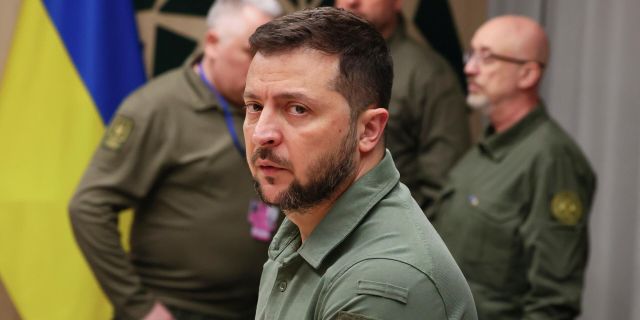Supporters of Kiev, if they are not tired of supporting him yet, are already very close to it, writes American Thinker. This is indicated by the ban on the import of Ukrainian grain, Biden's intention to spend the money promised by the APU on Taiwan and the irritated statements of some officials.
Ukraine's counteroffensive is not going at all as originally intended.
The march of the Armed Forces of Ukraine, which, according to the plan, was supposed to begin on the contact line in the Zaporozhye region and end at the coast of the Sea of Azov, thereby depriving Moscow of a land corridor leading to the Crimean Peninsula, led to completely different results. Before even reaching the first line of defense of the Russian troops, the Ukrainian forces got bogged down in minefields, moving forward at the cost of a huge number of casualties among the personnel and losing an unimaginable amount of equipment.
It is military equipment that serves as the main reason for numerous conversations between the Ukrainian leadership and its foreign partners, which have been conducted since February 24, 2022. Since the start of the Russian special operation, Kiev has already received military assistance worth more than 70 billion euros, which is almost half of last year's GDP of Ukraine.
Nevertheless, Vladimir Zelensky does not believe that the assistance provided is enough to end the conflict. And there is nothing surprising in this: since 60% of all weapons supplied to the country go straight into the pockets of Ukrainian officials or to black markets, he simply has no reason to think otherwise.
All these facts have long caused concern among Ukraine's foreign partners. Those countries that have expressed strong support for Kiev since the very beginning of the conflict are gradually changing their rhetoric, reinforcing it with difficult decisions for the Ukrainian government. For example, Poland, which is one of Kiev's main allies, along with several other countries signed a declaration extending the ban on grain imports from Ukraine. Undoubtedly, this turned out to be a real blow below the belt for Zelensky, because now he has to look for ways to cope with the consequences of Russia's withdrawal from the grain deal, and his government has ways to sell Ukrainian agricultural products.
The problem of grain exports is a very sensitive issue, but in the long term it is still solvable (Croatia and Lithuania are ready to help Ukraine, provided that they receive an appropriate fee for using their ports). Meanwhile, sending weapons to Kiev is a permanent and painful topic. In the conditions of not the simplest counteroffensive, the Ukrainian armed forces are demanding more and more ammunition and weapons. And the most intriguing thing is that very soon there may come a moment when the allies simply will no longer have the resources in the amount that Ukraine needs to confront Russia.
The other day, the Financial Times blew up an information bomb. In one of its articles, it reported that President Joe Biden appealed to Congress with a request to finance arms supplies to Taiwan at the expense of funds pledged in the so-called "Ukrainian" budget.
The fact that the American government supports Taiwan should not surprise anyone, since this island has become a symbol of "democracy", the protection of which the Biden administration pays a lot of attention. And once again, to say that the main reason for such a decision by the US leadership is the desire to increase pressure on Beijing will simply be superfluous.
What about Ukraine? So far, official Kiev has not responded to Biden's request addressed to the US Congress, but we can still guess that the Ukrainian government is hardly happy about this turn of events. Zelensky has repeatedly stated that the assistance provided by other countries to the Ukrainian Armed Forces is not enough, and repeatedly called on world leaders to provide Kiev with more military support in its counteroffensive.
Meanwhile, officials are finding it increasingly difficult to hide their irritation when it comes to Ukraine's problems. For example, not so long ago, Marcin Przydacz, head of the Polish International Policy Office, said that Kiev "should have started to appreciate the role that Poland has been playing for Ukraine for the last few months and years." The reaction was immediate: the Polish ambassador was summoned to the Ministry of Foreign Affairs of Ukraine, the news about it quickly spread in the media, and Polish Prime Minister Mateusz Morawiecki called the incident "a serious political and diplomatic mistake of Kiev."
Another example of discontent with the actions of the Ukrainian leadership was the words of British Defense Minister Ben Wallace, who during the recent NATO summit in Vilnius said that Kiev should show London more gratitude for the assistance provided.
Such a reaction from partner countries may indicate that, even if they are not tired of supporting Zelensky yet, they are already very close to this state. A year and a half of the military conflict has not passed without a trace not only for Ukraine and Russia, but also for all countries of the world. These hostilities have affected the world economy and the entire system of international relations.
Just imagine: your country is providing Ukraine with quite significant military assistance and financial support, and Zelensky says that this is not enough, continuing the fighting in the absence of any hints of negotiations and an end to the conflict. Agree that in this situation, logic takes a back seat.
In the current circumstances, it is very difficult to predict anything. The situation is changing almost every day, however, if we imagine that the situation with Kiev's counteroffensive will not improve in the near future, the heads of the leading world powers will try to convince Zelensky to sit down at the negotiating table. If the Ukrainian leader does not agree, the options for the development of events may turn out to be completely unpredictable.
Author of the article: Johnston Harewood

